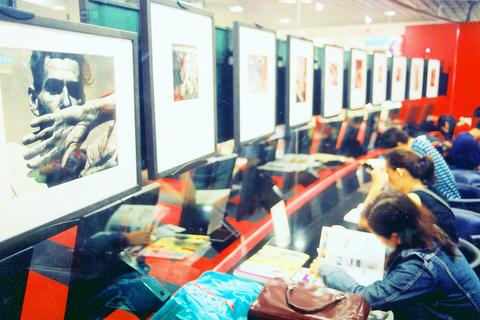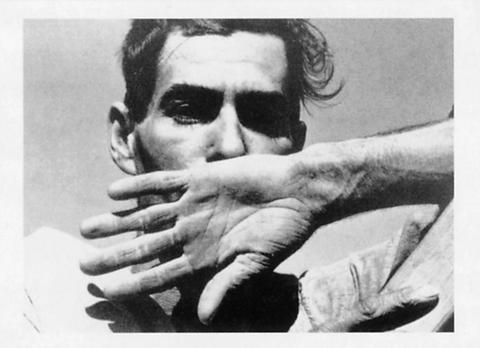One of the great photographers of the last century, Dorothea Lange is known for producing a number of images that went on to become icons of her time. So it's a little strange to have to push through a throng of magazine reading, time killing department store shoppers just to get a decent look at her original prints. But that's Fnac for you.
To it's credit, the French department store is successful at promoting culture, especially photography. It has incorporated photo galleries into both of its Taipei locations, and shows are usually interesting. But when the photographers are really good and really famous -- Lange merited her own retrospective at the Museum of Modern Art in New York in 1966 -- it's always a bit of a shock to see them in a shoppers' lounge.
On the third floor of the Fnac near the Taipei Train Station, which is located at 12 Kuanchian Rd., 32 of Lange's black and white prints will be on display through Sept. 5. Ten of them are in a room for reading and watching videos. While I was there one weeknight around the time of the evening rush, an opera was being shown on one wall, and most of the 30 or so chairs were filled with people and bunched on the opposite side of the room, blocking access to photos I had studied in college, like Cotton Picker, (1940). So to look at a few great photos, I had to push through people who were comfortably seated and zoning. It was kind of a crappy way to see art. Generally speaking, I like Fnac's conception of the Casual Gallery, but this was ridiculous.

PHOTO: DAVID FRAZIER, TAIPEI TIMES
But then again, maybe Lange's photos, as great as they are, don't have much to say to a youngish crowd of Taipei commuters. Lange is famous for her photographs of America's Great Depression. Along with Walker Evans, she produced the images that have come to define that era. In 1935, she and Evans embarked on a project jointly commissioned by America's Farm Security Administration and Federal Resettlement Administration to document the great changes then taking place.
Over the next seven years, Lange captured the sharecroppers of the south, displaced farmers of the midwest, convoys of unemployed Okies headed for California, and the bread lines and migrant worker camps that formed when they got there. And this is what's on display at Fnac, including famous images like Migrant Mother, (1936), White Angel Bread Line, (1932), and Street Demonstration, (1933).
But if her photos are irrelevant, then why show them? And of course they're not irrelevant. In addition to defining a slice of history, Lange's work represents both aesthetic and ethical developments in photography's history. Though she never considered herself an artist, she is remembered for a severe, graphic style that influenced later photographers of the 1950s and 1960s, like Irving Penn and Richard Avedon, who eventually carried photography the rest of the way into minimalism.

As a documenter and early photojournalist, Lange was one of the first to show people within their social context, and her rule was to shoot only what she saw, never to set up or manipulate her scenes. As such, she rightfully earned her reputation as one of the greats of the 20th century, so her photos deserve a decent viewing area. Had Fnac put them at their Nanking location, it would have been a better choice.

June 23 to June 29 After capturing the walled city of Hsinchu on June 22, 1895, the Japanese hoped to quickly push south and seize control of Taiwan’s entire west coast — but their advance was stalled for more than a month. Not only did local Hakka fighters continue to cause them headaches, resistance forces even attempted to retake the city three times. “We had planned to occupy Anping (Tainan) and Takao (Kaohsiung) as soon as possible, but ever since we took Hsinchu, nearby bandits proclaiming to be ‘righteous people’ (義民) have been destroying train tracks and electrical cables, and gathering in villages

Swooping low over the banks of a Nile River tributary, an aid flight run by retired American military officers released a stream of food-stuffed sacks over a town emptied by fighting in South Sudan, a country wracked by conflict. Last week’s air drop was the latest in a controversial development — private contracting firms led by former US intelligence officers and military veterans delivering aid to some of the world’s deadliest conflict zones, in operations organized with governments that are combatants in the conflicts. The moves are roiling the global aid community, which warns of a more militarized, politicized and profit-seeking trend

The wide-screen spectacle of Formula One gets a gleaming, rip-roaring workout in Joseph Kosinski’s F1, a fine-tuned machine of a movie that, in its most riveting racing scenes, approaches a kind of high-speed splendor. Kosinski, who last endeavored to put moviegoers in the seat of a fighter jet in Top Gun: Maverick, has moved to the open cockpits of Formula One with much the same affection, if not outright need, for speed. A lot of the same team is back. Jerry Bruckheimer produces. Ehren Kruger, a co-writer on Maverick, takes sole credit here. Hans Zimmer, a co-composer previously, supplies the thumping

Dr. Y. Tony Yang, Associate Dean of Health Policy and Population Science at George Washington University, argued last week in a piece for the Taipei Times about former president Ma Ying-jeou (馬英九) leading a student delegation to the People’s Republic of China (PRC) that, “The real question is not whether Ma’s visit helps or hurts Taiwan — it is why Taiwan lacks a sophisticated, multi-track approach to one of the most complex geopolitical relationships in the world” (“Ma’s Visit, DPP’s Blind Spot,” June 18, page 8). Yang contends that the Democratic Progressive Party (DPP) has a blind spot: “By treating any